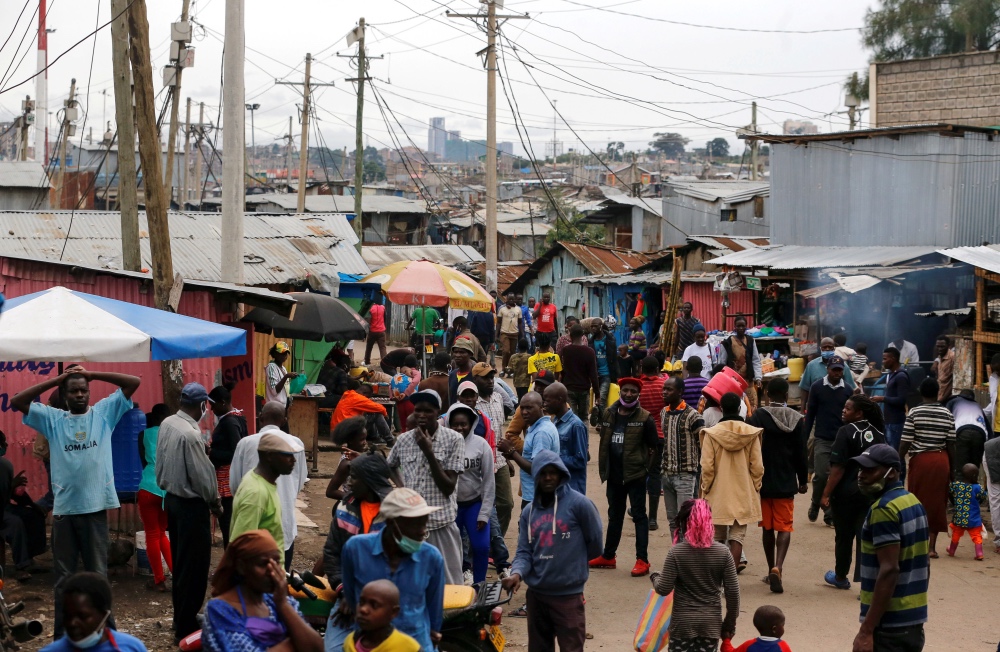Genevam Switzerland/Washington DC, US
Reuters
The number of people facing acute food insecurity could nearly double this year to 265 million due to the economic fallout of COVID-19, the United Nations’ World Food Programme said on Tuesday.
The impact of lost tourism revenues, falling remittances and travel and other restrictions linked to the coronavirus pandemic are expected to leave some 130 million people acutely hungry this year, adding to around 135 million already in that category.
“COVID-19 is potentially catastrophic for millions who are already hanging by a thread,” said Arif Husain, chief economist and director of research, assessment and monitoring at the WFP.
“We all need to come together to deal with this because if we don’t the cost will be too high – the global cost will be too high: many lost lives and many, many more lost livelihoods,” he told reporters at a virtual briefing in Geneva.

Residents gather along the streets of Mathare Valley slums amid the spread of the coronavirus diseasee in Nairobi, Kenya, on 19th April. PICTURE: Reuters/Thomas Mukoya/File Photo
Husain said it was critical to act quickly in order to prevent people already living hand-to-mouth, such as food vendors in Kenya, from selling their assets as it could take them years to become self-reliant again.
In some cases, such as when farmers sell their ploughs or oxen, it could have knock-on effects for food production for years to come, he added.
“These were the people we were concerned about – those who were OK before COVID and now they are not,” he said, adding he was “really worried” about people living in countries with little or no government safety nets.
“Acute food and livelihood crisis” is category three of five UN phases meaning a “critical lack of food access and above usual malnutrition”.
Category 5 means mass starvation. UN officials did not give a geographical breakdown of the growing needs, but said that Africa was likely to be hardest hit.
WFP expects to need $US10 to $US12 billion to fund its assistance programs this year compared to a record $US8.3 billion raised last year, Husain added. It plans to pre-position food stocks over the coming months in anticipation of growing needs.
Of those already deemed acutely hungry, many are in conflict zones such as Syria or in countries badly hit by the impact of climate change, according to a UN report.
Even before the coronavirus pandemic, desert locusts in east Africa had destroyed crops and boosted the number of people reliant on food aid.
Meanwhile, a senior World Bank official said on Tuesday that the poorest countries in the world face food insecurity and malnutrition due to the coronavirus pandemic, a drop in foreign exchange earnings, export restrictions and the breakdown of supply chains,
Mari Pangestu, the World Bank’s managing director for development policy, underscored the need for global cooperation to avert food crises in the most vulnerable countries in remarks to an online meeting of agriculture ministers from the Group of 20 major economies.
“Refrain from imposing export restrictions and avoid unnecessary import barriers and build up of stocks,” she said, adding that global grain production and stocks were at near all-time highs, making restrictions unnecessary.

An atrium is seen at the World Bank headquarters building during the IMF/World Bank annual meetings in Washington, US, on 14th October, 2017. PICTURE: Reuters/Yuri Gripas/File Photo
Pangestu told the ministers that concerted national actions, international cooperation and additional funding to shore up agricultural production could limit the risks of food insecurity and malnutrition.
“The G20 accounts for a large share of food trade and hence its actions will have significant global impact,” she said, urging G20 countries to ensure that supply chains for food continue to flow and to prioritise food and food-supply logistics as essential.
Food security emerged as a growing concern during virtual meetings last week of the World Bank and the International Monetary Fund with finance ministers from around the world.
In addition to the pandemic, which has triggered the deepest recession since the 1930s, the worst locust plague in decades is decimating millions of hectares of crops as it spreads across Africa, the Middle East, North Africa and South Asia.
Locust swarms have infested 23 countries, according to World Bank data. They have torn through large swathes of food crops in the Horn of Africa, where more than 24 million people are already “food insecure” and 12 million people are internally displaced, the Bank said in a recent blog posting.
The Food and Agriculture Organization of the United Nations estimates that 821 million people, or nearly 11 per cent of the world population, are undernourished, the highest rate since 2011.
Pangestu said the Bank, which is making $US160 billion available to respond to the pandemic over the next 15 months, is working closely with countries and international partners to monitor food supplies, and how the loss of income is impacting people’s ability to buy food.
She said it was critical to leverage community-based groups to distribute food, and implement social protection programs for the world’s poorest. Digital technologies could also help monitor harvest conditions and link producers with consumers.
Up to 80 per cent of the workforce in some of the poorest countries are both producers and net consumers in the agricultural and food sectors, she said, underscoring the need to make food supply a priority.
“Let’s not repeat what happened in 2008 when trade restrictions amplified world food price spikes and caused 130-155 million more people to fall below the poverty line, especially in the most vulnerable countries,” Pangestu said.
G20 agriculture and food ministers agreed at a virtual meeting on Tuesday that emergency measures to contain the spread of the pandemic must not create “unnecessary barriers to trade or disruption to global food supply chains.”






